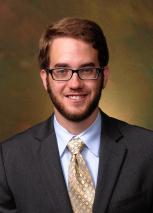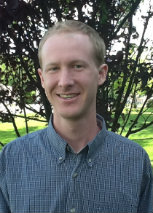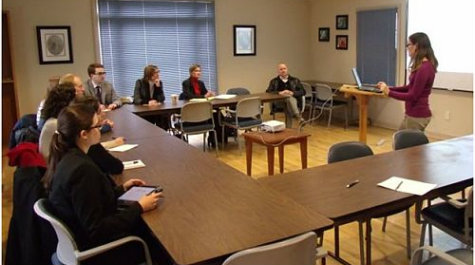Virginia Coastal Policy Clinic
Law students in this new clinic learn from scientists while they research the legal and policy implications of rising sea levels
The new Virginia Coastal Policy Clinic (VCPC) at William & Mary Law School enrolled its first group of law students this spring under the tutelage of attorney and clinic director Shana Jones. Thanks to a partnership between the Law School, the Virginia Institute of Marine Science (VIMS) and the William & Mary School of Marine Science, the clinic's first students learned about rising sea levels from marine science experts while investigating the legal and policy dilemmas that may face the Virginia coastal communities of Norfolk and Poquoson as a result.
"I wanted my students to have the experience of mastering the facts underlying environmental policy problems first," Jones said, "and then learn how the law and policy informs, or should inform, those facts."
Jones noted that although there is growing scientific evidence showing that sea level rise is accelerating, what is far less clear are the most effective steps that can be taken in response and the legal implications of each. "What is possible within the framework of existing law and regulatory structures? What might require new legislation? Where can we draw on precedent, and where might we need to break new ground?" These are just some of the questions, she said, that lawyers and policymakers will need to grapple with. "More and more," said Jones, "the environmental challenges we face will raise questions like these. The Virginia Coastal Policy Clinic can establish a model for finding answers through an interdisciplinary partnership."
Professor Carlton H. Hershner, Jr., director of the VIMS Center for Coastal Resources Management, said VIMS has a long-standing official role as the technical advisor to the state of Virginia and local governments on matters related to the coastal environment. "Over the years," he said, "we have identified a critical need for integrated legal analyses to fully inform our clients on many of the more complicated issues. The Policy Clinic is an outstanding solution, providing both close collaboration among faculty as well as a real-world training ground for both VIMS and law students."
The clinic offered students a crash course in practical learning about environmental topics from a range of sources. Students met with Hershner, Kirk J. Havens, and Molly Mitchell of the VIMS Center for Coastal Resources Management, and also heard from Skip Stiles, executive director of Wetlands Watch, and Joe Bouchard, who is a former delegate from Virginia Beach, former commander of Norfolk's Naval Base, and former member of Governor Tim Kaine's Virginia Commission on Climate Change. Members of the editorial board of the Virginian-Pilot also shared with them their perspectives on how the media covers environmental issues.
Alex Horning J.D. '13 was part of a group of students in the clinic who analyzed legal issues that could arise in Poquoson. Each team member was assigned a specific legal issue to analyze. Horning studied whether the city could be liable for failing to protect or provide city services to areas repeatedly flooded, and what steps, if any, the city should take to avoid liability.
Horning considers it an exciting time to be at William & Mary for those interested in land use or coastal policy. "The Law School's proximity to areas already dealing with sea level rise and its association with VIMS provide students an opportunity to learn about coastal policy in a practical way," he said. "Through the clinic, our group met major players in Virginia coastal policy. It is exciting to work and learn at the intersection of science, law, and policy with so many knowledgeable people. With the VCPC, we're hopeful that we can help local communities adapt to rising sea levels."
Professor Patricia E. Roberts, clinical associate director of law and director of Clinical Programs at the Law School, said the clinic is meeting a tremendous need for legal and policy analysis related to adaptive strategies for coastal communities. The creation of the interdisciplinary partnership, she said, was made possible with a start-up grant from the Virginia Environmental Endowment, and additional support has been pledged by Virginia Sea Grant, "both of which recognize the significant impact the clinic can have on coastal law and policy as Virginia proposes solutions to environmental risks that impact, among other groups, the most socially vulnerable among us."
Students Reflect on Their Interest in Environmental Law and Their Experiences with the Virginia Coastal Policy Clinic
Kelci Block J.D. '13
 Kelci Block is a graduate of the University of Central Florida, where she majored in political science. Her senior thesis explored Native American self-determination and the grey wolf. Wolves have continued to fascinate the Florida native. In 2012, The Environmental Law Reporter, News & Analysis published her note titled "Congressional Wolf Delisting and the Erosion of Separation of Powers."
Kelci Block is a graduate of the University of Central Florida, where she majored in political science. Her senior thesis explored Native American self-determination and the grey wolf. Wolves have continued to fascinate the Florida native. In 2012, The Environmental Law Reporter, News & Analysis published her note titled "Congressional Wolf Delisting and the Erosion of Separation of Powers."
"One of the more exciting things I did during college," Block said, "was working as an interpretive park ranger in Great Sand Dunes National Park in Colorado for a summer. I led nature hikes and gave presentations about the natural features of the park. The experience gave me a stronger appreciation for protecting our wild places."
Block is interested in several areas of environmental and animal law, including marine resources, clean air, and endangered species. During law school, she interned for numerous offices and organizations in Virginia, including the Attorney General's Office, where she worked with Assistant Attorney General Michelle Welch on animal cruelty issues, the Chesapeake Bay Foundation in Richmond, the Virginia Outdoors Foundation in Williamsburg, and the Southern Environmental Law Center in Charlottesville. She externed during the spring 2013 semester for the Wildlife Department of the Humane Society of the United States.
"At the clinic we researched the legal implications of planning for sea level rise in two Virginia jurisdictions: Poquoson and Norfolk," Block said. "I worked on the Poquoson side of the team, and I looked into the possible takings consequences of some of the adaptation measures Poquoson might implement."
Block hopes to work in a non-profit or governmental organization in the future.
"I'd like to make a difference, and advance protections for the environment, which is why this clinic was so exciting to me," she said. "We have an opportunity to try to influence the policies surrounding an imminent problem facing localities on Virginia's coast. Since most programs in law school are geared toward litigation, the Coastal Policy Clinic provided a welcome opportunity to gain practical experience in another career path while learning from someone who has actually done it. Shana Jones is a wealth of knowledge and was incredibly helpful in guiding us through this unfamiliar territory."
Daniel Doty J.D. '13
 Daniel Doty grew up in Washington state and Alaska, and completed his college studies at the George Washington University in Washington, D.C.
Daniel Doty grew up in Washington state and Alaska, and completed his college studies at the George Washington University in Washington, D.C.
"My two primary interests in the law are environmental law and criminal law," Doty said. "I like doing work that has a concrete and visible impact. If you practice environmental law as an advocate for the environment, you can actually see the effects of what you're working on. At least there is an actual physical location to visit, and protect, to help motivate you even in the face of setbacks. As a criminal lawyer, you know by your actions and advocacy that you're making an impact to protect a victim from dangerous people. I find that immediacy very satisfying."
Doty worked during summer 2012 for the prosecutor in Fairbanks, Alaska, focusing primarily on domestic violence cases. During his third year of law school he served as the editor-in-chief of the William & Mary Environmental Law & Policy Review.
"I'm interested in environmental law and preservation because the outdoors has always been second nature to me," he said.
Doty spent two weeks last summer driving back from Alaska, camping the entire way, and visiting national parks from Denali to the Badlands of South Dakota.
"These are resources that are important to me," he said, "and I can't imagine an America without public access to huge swaths of untamed wilderness. I'm fascinated by coastal policy in particular because I have lived in Virginia for eight years now, and the Tidewater is home to Virginia's and the East coast's most vulnerable ecosystems. I think there's room for someone with my interests and passions to make a huge difference here, and I want to bring some of that passionate outdoor culture of the West here to Virginia."
"Professor Jones has been wonderful," he said. "She's intelligent, well-connected, and accessible, and her enthusiasm for this new clinic was clear in every interaction with her. In a law school that prides itself on caring for its students, Professor Jones has really been one of the best examples I've seen of that ethic."
Alex Horning J.D. '13
 Alex Horning of Elizabethtown, Pa., graduated from Gettysburg College with a degree in environmental studies and political science. In college he had an opportunity to do environmental economics research for the National Oceanic and Atmospheric Administration relating to tidal wetlands, an experience, he said, that piqued his interest in land use and coastal policy.
Alex Horning of Elizabethtown, Pa., graduated from Gettysburg College with a degree in environmental studies and political science. In college he had an opportunity to do environmental economics research for the National Oceanic and Atmospheric Administration relating to tidal wetlands, an experience, he said, that piqued his interest in land use and coastal policy.
"At William & Mary, I had the opportunity to hone that interest," Horning said. "I worked for the Pennsylvania Department of Environmental Protection after my 1L year, and, during my 2L year, worked as an extern for Troy Hartley at Virginia Sea Grant, surveying climate change adaptation successes and failures in the region. Last summer I worked for Beveridge & Diamond, an environmental law firm in Washington, D.C., and will be returning there to work after taking the bar."
The Law School helped further his interest in marine resources, he said, by giving him the opportunity to take a course in environmental science at the College taught by Professor Dennis Taylor, and to extern with Virginia SeaGrant on the VIMS campus. He has also taken a land use course taught by one of Virginia's leading authorities on coastal law, Chancellor Professor of Law and Director of the W&M Property Rights Project Lynda Butler, and also a course on natural resources law taught by Professor Michael Walker, an EPA attorney who is director of the National Enforcement Training Institute in the Office of Enforcement and Compliance Assurance.
"The areas I find most interesting in environmental law are land use and wetlands," Horning said. "I was thrilled to learn that I could enroll in this clinic because coastal policy deals extensively with these two environmental topics. I think the science, law, and policy issues are more interesting where land and water meet."
